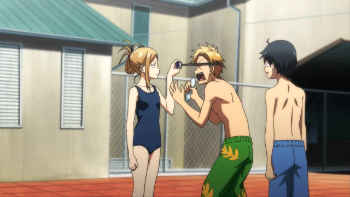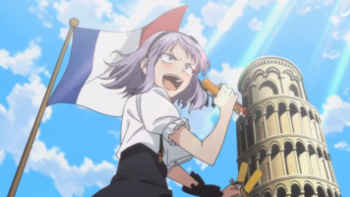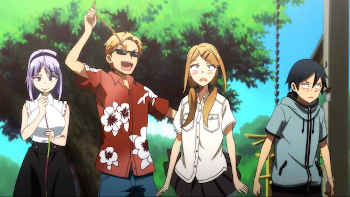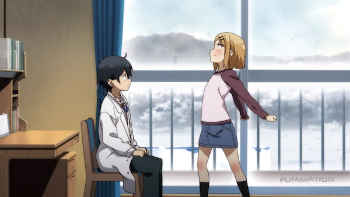

 |
 |
||||
| Home | Reviews | Extras | Forums |
|
Dagashi KashiSynopsisKokonotsu Shikada, called Kokonatsu ("coconuts") by most people, lives with his father Yo, a dagashiya owner, in a small rural town in Japan. He's an aspiring manga artist whose interest in dagashi has waned quite a bit since he was a kid, and this doesn't sit well with his father, who's afraid the store will close after he retires. He's itching to leave, which upsets his friend Saya Endou, who helps run a coffeeshop nearby and has a longstanding and fairly obvious crush on him (though he's oblivious, as that usually goes). Things are upended when Hotaru, an eccentric girl with a penchant for Victorian clothing and an otaku-esque obsession with dagashi, storms into their shop; her father runs a famous dagashi company, and she's trying to lure Yo away to work for him. Since he won't go anywhere until Kokonatsu agrees to take over the shop, she conspires to convince Kokonatsu to take over the shop by getting him to be just as obsessed with the quirks of dagashi as she is. ReviewA part of me really, really wants to say that Dagashi Kashi has a weird premise, but that's not exactly true. It's actually the common scenario of characters from a younger generation resisting the idea of taking up their parents' trade; this show comes across as quirky and weird to me, however, because that trade is running a dagashiya, of all things. Now, as this sort of story goes, Dagashi Kashi fits into the subset in which the younger character comes across as being at least a bit misguided for not being interested, and in which there's a lot of nostalgia for something that's clearly fading or dying. The quiet, pastoral setting makes me think this; just as mom-and-pop "old fashioned" candy shops in the United States are increasingly starting to feel like something out of a Norman Rockwell painting, the sort of place you never come across except in the smallest or most rural towns (or touristy places full of nostalgiabait), dagashi and dedicated dagashiya have long been on the decline in Japan. Anyhow, Dagashi Kashi is smart enough to run away with a vein of humor that focuses heavily on the quirks and idiosyncrasies in the packaging and presentation of dagashi, which is actually pretty entertaining, although I did sometimes come away feeling that these characters must really, really have nothing to do if this is what they spend their time doing. Still, it's good that this part of the show works, since it's really the main draw; the rest of the series' humor tends to fall into tired ecchi tropes, and there's no compelling drama to speak of. Making an entire show centered around dagashi funny is easier than it sounds because dagashi themselves are so weird; the staff behind Dagashi Kashi were also smart enough to break each episode into two skits, which keeps the jokes from being dragged out too long. Basically, the fun of dagashi is that they're unusual: you have some very clever imitations of "real foods," there's a whole art to how to properly eat them, at least according to Hotaru, and the characters on the packaging are adorably weird. Speaking of Hotaru, meanwhile, she's a big part of the appeal of the show, for me. From a pure eye-candy standpoint, I absolutely loved her Victorian skirts, blouses and hair accessories, and I honestly wouldn't mind having some of them. Also, it's both funny and sweet to me, as another fangirl, to see the depths of knowledge that her obsession with dagashi brings: even if dagashi aren't really what I'd want to know the inner workings of, power to her for it. On the other hand, she's a fashionable, cosmopolitan, and quirky person with a single-minded obsession with getting Kokonatsu, a hapless and fairly typical country boy prone to wanderlust, to get as into dagashi as she is, and this dynamic does have some unsettling elements of manic pixie dream girl syndrome. I'd cite the OP, in which she's shown dancing around and disappearing from different locations in the town, as more evidence for this, though as an aside, the opening song itself is a pretty catchy and funky indie-rock number. Anyway, because of that, I was happy that the show largely side-stepped romance in favor of dagashi-related gags, and that it pretty much eschewed love-triangle antics, too. Saya's initially (and predictably) jealous of Hotaru, but as it turns out, Hotaru's plan actually helps her by keeping Kokonatsu in town, so there's not much overt hostility between them and thus not much in the way of harem or love-triangle antics, thankfully.   Still, the show's weakest moments do tend to occur when the "ecchi" side takes over. Now, some of the racier jokes were amusing, like a skit in which Hotaru asks a flabbergasted Kokonatsu if he "likes boobs," only for "boobs" to be a mispronunciation of the name of round, ice-cream filled dagashi, and I will also admit to laughing when the dagashi exploded in the heat, moments later, with the result resembling a sex act that I don't really want to describe in detail in the non-adult parts of this site. I'll admit, I enjoy the right kind of raunchy humor. But on the other hand, there's a lot of tired, boring jokes you'd find in a harem comedy. The worst of these was when To, Saya's twin brother and basically the show's obligatory "pervert best friend" character, talks Kokonatsu into drawing a picture of his sister with big boobs, only for him to leave his sketchbook in Saya's coffeeshop and spend a whole half-episode trying to get back to it before she sees it, which, of course, culminates in a "you stupid pervert!" type confrontation. Generally, To tends to sink the show down a few notches when he's around, since I dislike that type of character as a rule, and Kokonatsu's father isn't much better, being a pretty typically macho dad who's constantly trying to push his son to be more forward with "the girls" and who's also distinctly less mature than his son. But if it's the trio of Kokonatsu, Hotaru, and Saya carrying the show, and if the jokes are dagashi-focused, then things tend to be good. Yes, Kokonatsu's a bit of a boring protagonist, but he makes for a decent level-headed foil to Hotaru's eccentricities, even if his obliviousness to Saya's crush can be infuriating; it was somewhat amusing to see (via flashback) how dense he was, years ago, even when Saya attempted to play doctor with him, where he instead got way more interested in using dagashi as medicine. There's also an especially funny episode in which Hotaru manages to get drunk off of a dagashi powder that foams into a realistic-looking and tasting beer when added to water; it's supposed to be a fun, non-alcoholic treat for kids, so I guess Hotaru's especially prone to placebo effects, reminding me of an infamous episode of Michiko and Hatchin in which the latter character gets drunk off her ass on orange juice. Another funny gag, if a very racy one, features Hotaru blindfolding herself and tying her hands behind her back while tasting and guessing at different flavors of fugashi sticks which, well, the word "stick" might give you some sense of how the camera frames this; it doesn't help that when she ties him up instead, to do the reverse, she runs off for a drink on a whim and leaves him in the shop, where Yo comes back and comes to the perfectly logical conclusion that what he's doing isn't exactly so innocent.    Incidentally, Kokonatsu's interest in manga basically drops completely into the background after the first episode, the aforementioned boob-drawing joke aside. I have to admit that this felt like a bit of a waste, given that his manga-drawing turns into the "token hobby" used to distinguish an otherwise pretty standard protagonist. On the other hand, it does mean that this show is, ultimately, fairly upfront about being little besides a comedy, which is actually fine by me. Dagashi Kashi does have some sweet moments between Saya and Kokonatsu, which, given how intensely a relationship between Kokonatsu and Hotaru would scream wish-fulfillment, is probably the better way to go. But the show isn't well-written enough to shoulder much drama, or to really mix comedy and drama well. What we get, basically, is a pleasant but fairly open-ended and inconsequential show, one that makes a standard "doesn't want to inherit their parents' trade" story worth the time by choosing an especially weird and culture-specific subject and making it funny. So I won't really fault the show, not to mention that it is, in general, pretty beautiful-looking. Those who like anime about rural Japan for the eye candy have nothing to worry about; a show this steeped in nostalgia for a cultural item that, by now, is increasingly seen as outdated and quaint would, of course, put itself in a rural setting and make this small town as pretty as possible, if also sort of empty (you honestly hardly see a single character besides the ones I've mentioned by name in this review). The art and backgrounds are lovely, and I like the character design, even if I couldn't ever quite shake the feeling that Hotaru was like a less unstable doppelgänger of Anna from Shimoneta. Not to say that's necessarily bad, but if you've seen that series, well, you know how I might react to seeing that character show up elsewhere.    Because of work, school, and a mix of other things, I was picky about which shows I actually watched and finished during the Winter 2016 season; Dagashi Kashi caught my attention because of its premise, and it stayed funny enough for me to finish it. It's more of an amusing series than a hilarious one, and so I'm not sure what its staying power really is, but given how alike so many anime slice-of-life comedies can seem, with their harem antics, it's a show that ran with a quirky topic, generally milked it for what it was worth, and kept most (but not all) of its cast on the likable side. So I can give it a cautious recommendation, in the end. An amusing and likable if somewhat one-dimensional show that's better than most slice-of-life comedies of its kind simply because it manages to keep the novelty of its, well, novelty item-centered premise from wearing too thin. Maybe knock of a star if you can't handle raunchy humor whatsoever, since that's part of the fun; you could also definitely accuse it of being a glorified commercial for dagashi. — Nicoletta Christina Browne Recommended Audience: It's a raunchy show; there's not that much in the way of nudity, but you get a lot of boob jokes, penis jokes, and characters "misunderstanding" things as being sexual in nature. So this isn't really for kids. But there's nothing in the way of violence or profanity. Version(s) Viewed: Stream courtesy of FUNimation.com, Japanese with English Subtitles. Review Status: Full (12/12) Dagashi Kashi © 2016 KOTOYAMA, Shogakukan/Shikadadagashi |
 |
|
| © 1996-2015 THEM Anime Reviews. All rights reserved. |